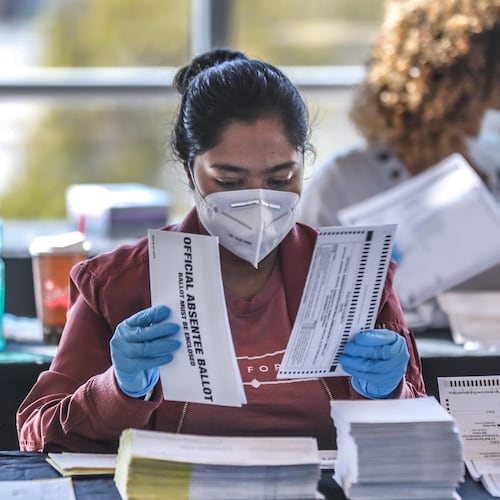A $1.7 billion verdict against Ford Motor Co., the largest jury award in Georgia, has been scrapped by the state’s Court of Appeals, teeing up a third trial in the case of a fatal “Super Duty” truck rollover.
State appellate judges said a Gwinnett County judge improperly sanctioned Ford in the first trial in the case, preventing the automobile giant from arguing in the second trial that it was not liable in the deaths of Georgia couple Melvin Hill, 74, and Voncile Hill, 62.
Jurors in the second trial slapped Ford with a $1.7 billion verdict in August 2022 after being presented with evidence that the roofs of its “Super Duty F-250″ trucks were weak and prone to crushing occupants in rollovers. The verdict took into account the 5.2 million such trucks Ford had sold between 1999 and 2016.
“We must reluctantly vacate the jury’s verdict and the resultant judgment and remand for a new trial,” the Georgia Court of Appeals said in a Nov. 1 opinion.
Ford praised the decision, which was condemned by the attorneys representing the Hills’ children, Kim and Adam Hill.
“We look forward to a new trial where we can provide the jury with the true facts of the case and evidence of the safety of the Super Duty trucks,” a Ford spokesman said. “Three prior juries in other cases have been asked the same question, and all three juries determined that, in fact, the vehicle was not defective. We stand by the safety of the Super Duty line of pickup trucks and all our vehicles.”
In court filings, attorneys for Kim and Adam Hill have said Ford “cherry-picked” three cases to boast about, having settled more than 200 other cases alleging defective roofs in Super Duty trucks.
The Hills’ lawyers said they will seek review in the Georgia Supreme Court. They said Ford deliberately provoked a mistrial in 2018 to avoid a large verdict.
“We are all very disappointed with the Court of Appeals’ decision, and respectfully disagree with that decision,” said lead counsel James E. Butler Jr.
Michael B. Terry, another attorney for the Hills, said the ruling strips trial judges of the ability to enforce their orders.
“This is very bad news for trial judges and litigants,” Terry said. “The limited penalties available under this decision are useless to address intentional misconduct during a trial.”
In the first trial held in 2018 before Judge Shawn F. Bratton, an attorney for Ford asked a company expert whether Melvin Hill died because the roof of his 2002 Ford Super Duty F-250 pickup crushed the back of his head. The expert, Dr. Thomas McNish, said “No.”
The attorney, Alan Thomas, was punished alongside Ford for violating an order barring McNish from opining on the Hills’ cause of death. The expert’s testimony prompted a mistrial.
Bratton also found fault with other actions by Ford and its attorneys in the first trial. As punishment, he ordered that the second trial would only focus on the amount of damages Ford should pay.
Jurors in the second trial, held in 2022 before Judge Joseph C. Iannazzone, were told by him that due to Ford’s misconduct in the first trial, its liability had been established. The jurors were instructed by the court that the roof on the Hills’ truck was defectively designed, dangerously weak and susceptible to collapse in rollover accidents.
The court also established that Ford’s failure to strengthen the roof was willful and reckless, as it knew of the dangers and had a duty to warn users, and that the weak roof crushed the Hills, causing their deaths. The evidence Ford could not present included that Melvin and Voncile Hill appeared to have tucked the shoulder straps of their seat belts under their arms.
The Court of Appeals said Bratton correctly held that Ford violated his order about McNish’s testimony, but was wrong to find the company had violated other orders. Bratton’s sanctions against Ford, crippling its defense in the second trial, were too harsh, the appellate court ruled.
It determined that in a retrial, Ford can present evidence about the way Melvin and Voncile Hill wore their seat belts. And other previously barred evidence can be reconsidered by a trial judge. Appropriate sanctions against Ford can also be reconsidered in the trial court.
The crash occurred in April 2014 when Melvin and Voncile Hill were traveling from their Macon County home to Americus to pick up a tractor part.
The jury in the second trial assigned 30% of the blame to Pep Boys and three employees, who settled with the Hills’ sons in 2018. The plaintiffs claimed in that action that the Pep Boys defendants placed the wrong tire on their parents’ truck, causing it to lose control.
About the Author
Keep Reading
The Latest
Featured



